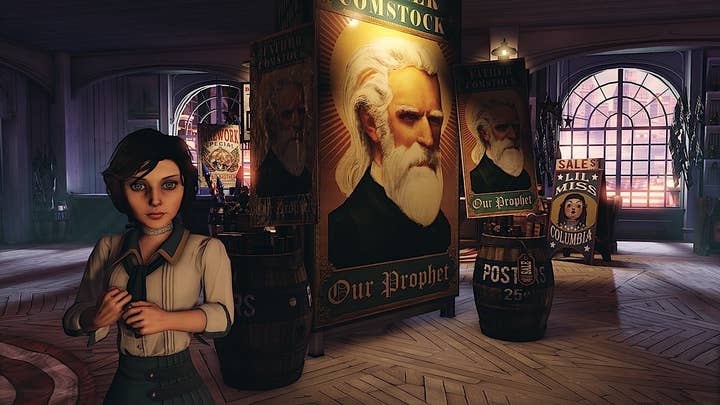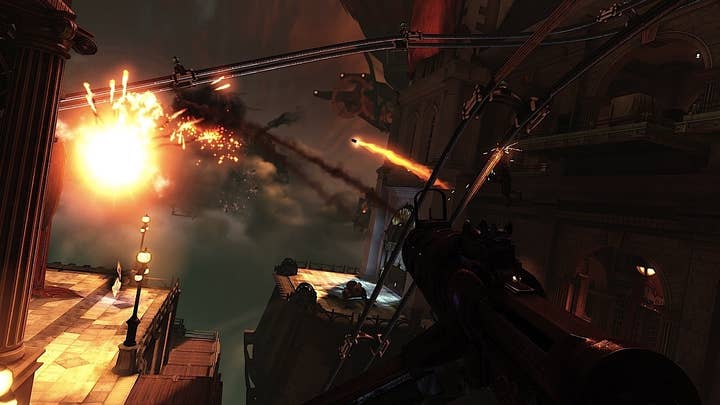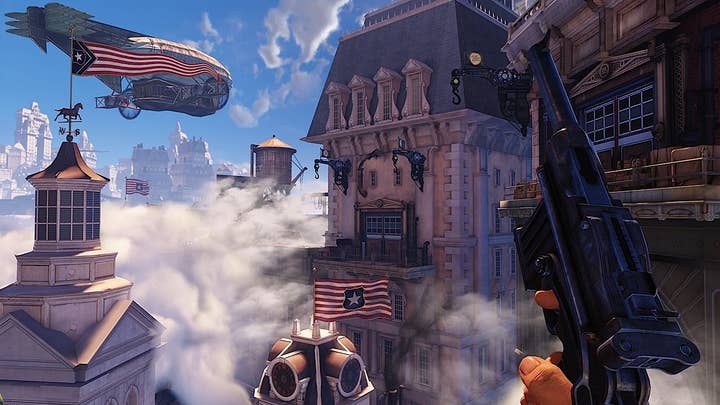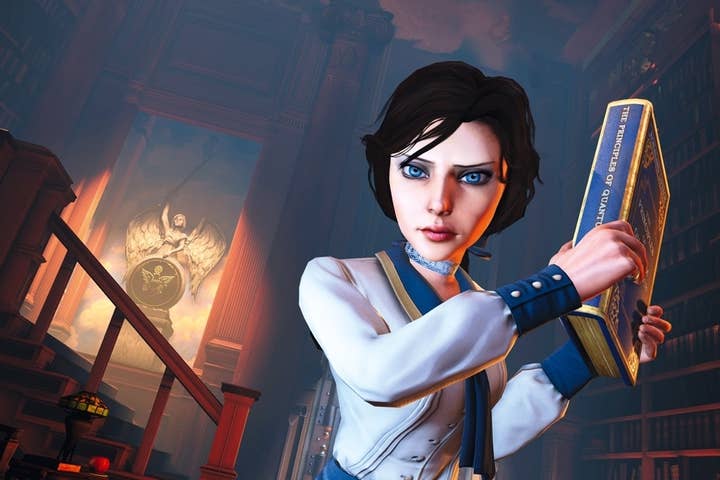Critical Consensus: Bioshock Infinite
The wait is finally over, and Irrational Games has justified every last minute
Bioshock is one of those rare games that bridges the gap between the gloss and excitement of AAA and the ideals and vision of independence. It was a strange beast back in 2007, and in 2013 it seems stranger still.
As production and marketing budgets have swelled over the course of this generation, the margin for error in the mainstream market has been reduced to a wisp; to the degree that the chances of being given as daring and thoughtful a blockbuster as Irrational's masterpiece ever again seemed just as slender. Well, good news everyone, Bioshock Infinite is finally here and, but for a few niggles, it's everything you hoped it would be.
"The fact that you come to take Elizabeth's unlikely existence for granted is one of the strangest and most brilliant things about Bioshock Infinite"
Tom Bramwell, Eurogamer
"It would be hard not to begin with Elizabeth," writes Eurogamer's Tom Bramwell, and there's no arguing with his logic. Elizabeth is [the protagonist] Booker DeWitt's near-constant companion, and one of the game's major creative goals - Infinite's equivalent of Bioshock's Big Daddies and Little Sisters. Irrational wanted to create an NPC with personality and soul, who did more than simply ask to be rescued before wandering into the line of fire. And, as the 10 at the end of Bramwell's review suggests, Irrational has honoured that promise in fine style.
"She never gets in your way, and while it becomes apparent from time to time that she is being subtly teleported around out of sight to fit the circumstances of your behaviour, you dismiss any sense of her artificiality as quickly as you would déjà vu.
"And if she ever disappears from view for than a few moments, you miss her. You miss the way she tosses you items as you explore and fight...and the conversations you have as she picks locks or rides an elevator with you. She never feels like a MacGuffin or a damsel in distress and you never feel like you're protecting her. You're not supposed to fall in love with her either. You just like her. The game creates a familial bond.
"The fact that you come to take Elizabeth's unlikely existence for granted is one of the strangest and most brilliant things about Bioshock Infinite."

And there are many more brilliant things, all of them laid out so expertly by Irrational that Infinite manages to polish down Bioshock's few but noticeable rough edges. According to Polygon's Arthur Gies, the game's long development cycle - which was capped by a series of high-profile staff departures on the home stretch - suggested an ambitious idea in considerable turmoil, but the finished product is a paragon of coherent design and subtle game balancing. Players are introduced to key concepts like Columbia's skylines and plasmid-esque Vigors gradually, with ample time to recalibrate to their new tools and understand where they fit in the bigger picture.
"The logical, organic placement of game design bits and pieces in a world that still lived and moved and reacted to my introduction...make sure Columbia isn't background noise to Infinite's remarkably strong mechanics and game design," Gies writes in a review that, sure enough, climaxes with a perfect 10.
"When it seemed like some new tactic or action might be a good or cool idea, I almost always found it worth trying"
Arthur Gies, Polygon
"It all matters. The original Bioshock was a shooter known for story and atmosphere, for cool ideas amidst mechanics that often weren't executed as well or as seamlessly as other shooters with less ambition. Bioshock Infinite isn't as constrained.
"I started Infinite on the run as often as not, which forced me to learn what I could do. It's also helpful that Infinite controls smoothly, that its combat and platforming feel responsive, and AI is tuned to that. Enemies are less like animatronic monsters in a theme park ride, and more like active agents in an environment. As I progressed, I found increasingly more complex sandbox-driven encounters that seemed like essay exams on the mechanics I had learned... Infinite consistently delivers on the satisfaction of success driven by clever play. When it seemed like some new tactic or action might be a good or cool idea, I almost always found it worth trying."
So far, so superlative, but there are a handful of doubters among the acolytes - chief among them Videogamer's Steve Burns, whose 8 out of 10 review will likely suffer all manner of heinous accusations despite being an essentially positive appraisal. In many ways, Burns argues, Bioshock Infinite is extraordinary, even important, but its reliance on pitched battles with a limited roster of enemy types tarnishes the strong work elsewhere. Infinite's combat is good, but it is doled out in such volumes that it undermines the string work elsewhere.

"Infinite feels shamelessly padded, and if Irrational wanted to give players more content then all it has really done is expose how rudimentary its combat mechanics really can be," Burns writes. "Sadly, as the hours wear on the combat becomes more and more grating, as there's no real sense of escalation in either your abilities or your enemies. Fighting cops and guerrillas for the most part means fighting humans, reducing the combat to the same tactics over and over again.
"As for bringing items in through tears: it feels gimmicky almost straight away. Surely, if Elizabeth can open up doorways to other worlds, we could have had some delicious set pieces: trucks bursting out onto enemies, planes crashing through. Instead we get the same combination of sniper rifle/ a bit of cover/skyhook/robot auto turret, like the only place Liz can look into is an under-construction Skynet HQ."
"A convincingly human policeman, soldier or guerrilla rebel you will not find here: they are bellowing monsters, without the excuse of backfired genetic experimentation"
Alec Meer, Rock Paper Shotgun
Of course, it's necessary to take all criticisms of a game like Infinite in their proper context. Videogamer's gripes, while no doubt legitimately felt, are still accompanied by plaudits like, "one of the most compelling games of this generation." Irrational is one of the most consistently brilliant studios in the industry, and Infinite's assumed genius has been gradually building for three years - in that climate, critics often spend longer explaining niggling problems than they do broad strokes of brilliance.
Just ask Rock Paper Shotgun's Alec Meer, who raises the excellent point that, in hindsight, it's easy to forget how few preconceptions greeted Bioshock all those years ago. The twists and turns of its narrative were only celebrated after the fact, but Ken Levine's touch was so assured in that respect that story has become one of Infinite's most alluring qualities. Indeed, Meer suggests that Infinite may be "a victim of its storyline," the elaborate and seductive construction of its world rubbing up against the machinery grinding beneath. In terms of what you actually do, Bioshock Infinite is a game that, "speaks the language of guns." Nobody bats an eyelid when Booker bursts into a store wielding a shotgun, but the care and detail in the environment and its residents makes it seem like they should.
"Perhaps it's a statement on how the far reaches of the upper class treat anyone who isn't like them as too far beneath them to warrant even recognition. But I think it's just because they're glassy-eyed automatons sharing a surprisingly small handful of faces and voices, and who are conveniently made to vanish immediately and without trace as soon as the game decides it's time for the shooty-bang-bang... I'd anticipated and accepted that long before going in and so was never going to complain that a first-person shooter was a first-person shooter, but I did feel frustrated that these hints of the game being something more don't bear out.

"There are extensive scenes of society, yes, and engrossing ones at that - but they are only scenes to be seen, glass cases in a sprawling museum, and they are all too easily and all too often replaced by sudden ghost towns haunted only by men (and women) who scream blood and fury as they aim their guns at you. Enemies are Splicers without the masks, essentially... With just a few scripted exceptions, a convincingly human policeman, soldier or guerrilla rebel you will not find here: they are bellowing monsters, without the excuse of backfired genetic experimentation."
But these are luxurious problems to have. Games of less vaulting ambition than Bioshock Infinite don't have to answer to accusations of dissonance because their achievements simply don't merit them. Irrational has managed to create a game that deals with huge questions and sensitive issues without trivialising them or appearing ridiculous for even trying. This, Edge magazine argues, is the ultimate proof that Infinite is not only an unqualified success, but also a worthy successor to its hallowed forebear.
"Like Rapture, Columbia indoctrinates its citizens through a familiar mix of cheery propaganda and vaudevillian exhibits. And like Rapture, it tells much of its story via characters who presumably spend a fortune replacing the audiotapes that they carelessly scatter about on their morning walks. DeWitt's journey through the city, meanwhile, takes familiar form. He still travels from one themed, self-contained locale to the next - from piers to factories to poor districts - just not by bathysphere.
"Bioshock Infinite is a sequel, in short - more so than BioShock 2. Irrational has made a game in thematic dialogue with its predecessor, with the same interests but different tastes, and one that expands mechanically and technically on what came before. And it's given us a city in the sky that reflects upon the one beneath the waves."

